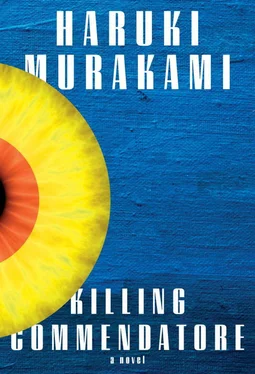“Take your time, tell it in whatever order is easiest for you. And then we’ll consider it together. The two of us might come up with a good idea that you couldn’t come up with on your own.”
So I told him the story, start to finish. How I suddenly woke up just before two a.m. and heard a weird sound in the darkness. A faint, far-off sound that I could only catch because the insects had stopped chirping. A sound like someone ringing a bell. When I tried to trace the source, it seemed to be coming from between the cracks in a stone mound in the woods behind my house. That mysterious sound continued for some forty-five minutes, intermittently, with irregular intervals of silence between. Finally it stopped completely. The same thing happened two nights in a row—two nights ago and last night. Someone might be ringing that bell-like thing from underneath the stones. Maybe sending out a distress call. But could that be possible? I was starting to doubt my own sanity a little. Was I just imagining things?
Menshiki listened to my story without comment, and remained silent even after I finished. He’d listened intently to what I’d said, and I could tell he was thinking deeply about it.
“A fascinating story,” he said a little while later. He lightly cleared his throat. “As you said, it’s certainly out of the ordinary. I wonder… if possible, I’d like to hear the sound of that bell myself, so could I come over tonight? If you don’t mind?”
This took me by surprise. “Come all the way over here in the dead of night?”
“Of course. If I hear the bell too, that would prove you’re not hallucinating. That’s the first step. If it is an actual bell, then let’s try to locate the source, the two of us. Then we can think about what to do next.”
“True enough—”
“If you don’t mind, I’ll come over here tonight at twelve thirty. Does that work for you?”
“That’s fine, but I don’t want to put you out—”
A pleasant smile graced his lips. “Not to worry. If I can help you, nothing would make me happier. Plus, I’m a very curious person. What that bell in the middle of the night might mean, and if someone is ringing it, who that is—I’m dying to know. You feel the same way, don’t you?”
“Of course—” I said.
“Then let’s go with that. I’ll see you tonight. And there’s something else I thought of.”
“Excuse me?”
“I’ll tell you about it later. I have to make sure of something first.”
Menshiki got up from the sofa and held out his right hand. I shook it. As always, a firm handshake. He looked happier than usual.
—
After he left I spent the rest of the afternoon in the kitchen cooking. Once a week I prepare all my meals. I put them in the fridge or freezer, then get by on these for the week. This was my meal-prep day. For dinner that evening I added macaroni to some boiled sausage and cabbage. Plus a tomato, avocado, and onion salad. In the evening I lay on the sofa as always, reading while listening to music. After a while I stopped reading and thought about Menshiki.
Why had he looked so happy when we said goodbye? Was he really so pleased to be able to help me out? Why? I didn’t get it. I was just a poor, unknown artist. My wife of six years had left me, I didn’t get along with my parents, had no set place to live, no assets, and was simply hanging out in a friend’s father’s house. Menshiki, in contrast (not that there was any need to make a comparison), had been successful at business at a young age, and made enough to live comfortably for the rest of his days. At least that’s what he had told me. He was good-looking, owned four British cars, and lived in luxury in a huge mountaintop mansion without, apparently, doing any real work. So why would a person like that be interested in someone like me? And why would he make time in the dead of the night to help me out?
I shook my head and went back to reading. Thinking about it wasn’t going to get me anywhere. It was like trying to put together a puzzle that was missing some pieces. I could think all I wanted and never arrive at any conclusion. But I couldn’t help but think about it. I sighed, and put the book on the tabletop again, closed my eyes, and listened to the music. Schubert’s String Quartet no. 15, played by the Vienna Konzerthaus Quartet.
Since coming here, I’d listened to classical music every day, most of it German (or Austrian), since the majority of Tomohiko Amada’s record collection consisted of German classical music. His collection included the obligatory nods to Tchaikovsky, Rachmaninoff, Sibelius, Vivaldi, Debussy, and Ravel, but that’s all. Since he was an opera fan there were, as you might expect, some recordings by Verdi and Puccini. But compared to the substantial lineup of German opera he didn’t seem as enthusiastic about these.
I imagined Amada had intense memories of his time studying in Vienna, which may have accounted for the deep absorption in German music. Or it could have been the opposite. Maybe his love of German music had come first, and that’s why he had chosen to study in Vienna instead of France. I had no way of knowing which had come first.
Either way, I was in no position to complain that German music was the preferred type in this house. I was a mere caretaker, and they were kind enough to let me listen to the records there. And I enjoyed listening to the music of Bach, Schubert, Brahms, Schumann, and Beethoven. Not forgetting Mozart, of course. Their music was deep, amazing, and gorgeous. Up to then in my life I’d never had the opportunity to really settle down and listen to that type of music. I’d always been too busy trying to make a living, and didn’t have the wherewithal financially. So I decided that, as long as I’d been provided this wonderful opportunity, I’d listen to as much music here as I could.
After eleven I fell asleep for a while on the sofa listening to music. I might have slept for about twenty minutes. When I woke up the record was over, the arm back in its cradle, the turntable not moving. There were two players in the living room, one an automatic, the other an old-school manual type, but to play it safe—so I could fall asleep listening, in other words—I generally used the automatic. I slipped the Schubert record back in its jacket, and returned it to its designated spot on the record shelf. From the open window I could hear the clamor of insects. Since they were still making a racket, I wouldn’t be hearing the sound of the bell quite yet.
I warmed up coffee in the kitchen and munched on a few cookies. And listened intently to the noisy insect ensemble that enveloped the mountains. A little before twelve thirty I heard the Jaguar slowly making its way up the slope. As it changed direction, the pair of yellow headlights lit up the window. The engine finally cut out, and I heard the usual solid thunk as the door shut. I sat on the sofa, sipping coffee, getting my breathing under control, waiting for the front doorbell to ring.
13
AT THIS POINT IT’S MERELY A HYPOTHESIS
We sat in chairs in the living room, drank our coffee, and talked, killing time until that time rolled around. At first we chatted about inconsequential things, but after a curtain of silence descended on us Menshiki, a bit hesitantly, yet resolutely, asked, “Do you have any children?”
The question took me by surprise. He didn’t seem the type to ask that kind of question—especially of someone he didn’t know well. He seemed more the I-won’t-stick-my-nose-in-your-business-if-you-won’t-stick-yours-in-mine type of person. At least that’s the way I read him. But when I looked up and saw his serious expression, I knew it wasn’t an impulsive question. He’d been thinking of asking me this for a long time.
Читать дальше











